- Home
- Ian Mcewan
The Cement Garden Page 4
The Cement Garden Read online
Page 4
It was a good find, probably left by the firemen or a demolition team. I balanced it over my shoulder and carried it home, wondering what I could usefully smash up. In the garden the rockery was disintegrating and overgrown. There was nothing to lay into apart from the paving stones, and they were already cracked. I decided on the cement path—fifteen feet long and a couple of inches thick. It was serving no purpose. I stripped down to the waist and set to. A little concrete crumbled away on the first blow, but the next few produced nothing, not even a crack. I rested and began again. This time, surprisingly, a great fissure opened up and a large, satisfying piece of concrete came away. It was about two feet across and heavy to lift. I pulled it clear and rested it against the fence. I was about to pick up the hammer again when I heard Julie’s voice behind me.
“You’re not to do that.”
She was wearing a bright green bikini. In one hand she held a magazine and in the other her sunglasses. Round this side of the house we were in deep shade. I rested the hammerhead on the ground between my feet and leaned on the handle.
“What are you talking about?” I said. “Why not?”
“Mum said.”
I picked up the hammer and swung it at the path as hard as I could. I looked over my shoulder at my sister who shrugged and was walking away.
“Why?” I called after her.
“She’s not feeling well,” said Julie without turning round. “She’s got a headache.”
I swore and rested the hammer against the wall.
I had accepted without curiosity the fact that Mother was rarely out of bed now. She became bedridden so gradually we hardly commented on it. Since my birthday, two weeks before, she had not been up at all. We adapted well enough. We took it in turns to take up the tray, and Julie shopped on the way back from school. Sue helped her cook and I washed the dishes. Mother lay surrounded by magazines and library books, but I never saw her reading. Most of the time she dozed in a sitting-up position, and when I came in she would wake up with a little start and say something like: “Oh, I must have dropped off for a moment.”
Because there were no visitors, there was no one to ask us what was wrong with her, and so I did not really put the question clearly to myself. Julie, it turned out, knew far more. Every Saturday morning she took the prescription for renewal and came back with the brown bottle full once more. No doctors came to see Mother. “I’ve seen enough doctors and I’ve had enough tests to last me a lifetime.” It seemed reasonable to me to tire of doctors.
Her bedroom became the center of the house. We would be there, talking among ourselves or listening to her radio, while she dozed. Sometimes I heard her giving Julie instructions about the shopping or Tom’s clothes always in a soft and rapid undertone. “When Mother gets up” became a vague, unsought-for time in the near future when the old patterns would be reestablished. Julie appeared serious and efficient, but I suspected she was exploiting the position, that she enjoyed ordering me about. “It’s about time you cleaned up your room,” she said to me one weekend.
“What do you mean?”
“It’s a mess, it smells in there of something.” I said nothing. Julie went on, “You better clean it up. Mum said.”
Because my mother was ill I thought that I should do what she asked, and while I did nothing to my room I thought about it, I worried about cleaning it up. Mother never mentioned my room to me, and I began to think she had never said anything to Julie.
After staring at my sledgehammer for a minute or two, I walked round to the back garden. It was mid-July, only a week before the summer holidays began, and it had been hot every day for six weeks. It was difficult to imagine it ever raining again. Julie was anxious to be suntanned and had cleared a little flat patch on top of the crumbling rockery. Each day she spread out her bath towel for an hour after school. She would lie with her hands and fingers flattened on the ground beside her, and every ten minutes or so she turned over onto her belly, hooking loose with her thumbs her bikini straps. She liked to set off her deepening color with a white school blouse. She had just settled down again as I came round the corner. She lay on her belly, head cradled on her forearms and face turned away from me toward the wasteland next door where great clusters of stinging nettles were dying of thirst. At her side, lodged between her sunglasses and a thick tube of suntan lotion, was a miniature transistor radio, silver and black, from which came the thin, rattling sound of male voices. The sides of the rockery dropped sharply away from where she was lying. A slight movement to her left and she would be rolling down toward my feet. The shrubs and weeds were withered, and her bikini, brilliant and luminescent, was all that was green on the rockery.
“Listen,” I said to her over the radio voices.
She did not turn her head my way, but I knew she had heard me.
“When did Mum tell you to tell me to stop making that noise?”
Julie did not move or speak so I clambered round the rockery in order to see her face. Her eyes were open.
“I mean, you’ve been out here all the time.”
But Julie said, “Do me a favor, will you, and rub some lotion on my back.”
As I climbed up my foot dislodged a large rock and it thudded to the ground.
“Careful,” Julie said.
I knelt between her open legs and squirted from the tube a pale creamy fluid onto my palm.
“Up by my shoulders and neck,” said Julie, “is where it needs it most,” and dropping her head she lifted her hair clear of her nape.
Although we were only five feet above the ground, up here there seemed to be a slight and refreshing breeze. As I rubbed the cream into her shoulders I noticed how pale and grubby my own hands appeared against her back. Her shoulder straps were untied and trailed on the ground. If I moved a little to one side, I could just make out her breasts, obscure in the deep shade of her body. When I had finished she called over her shoulder, “Now do my legs.”
This time I rubbed the cream on as quickly as I could, with my eyes half closed. I felt hot and sick in the stomach. Julie’s head was resting once more on her forearm and her breathing was slow and regular, like someone asleep. From the radio a piping voice was recounting racing results with malicious monotony. As soon as her legs were adequately coated I jumped down off the rockery.
“Thanks,” Julie called out to me sleepily.
I hurried indoors and upstairs to the bathroom. Later that evening I threw the sledgehammer down into the cellar.
EVERY THREE mornings it was my turn to walk Tom to his school. It was always difficult to get him to go. Sometimes he screamed and kicked and had to be carried out of the house. One morning, shortly before the end of term, he told me quite calmly as we walked along that he had an “enemy” at school. The words sounded eerie on his lips and I asked him what he meant. He explained that there was a bigger boy out to get him.
“He’s gonna bash my head in,” he said in a tone close to wonderment.
I was not surprised. Tom was just the kind to be picked on. He was small for a six-year-old, and frail. He was pale, a little jug-eared, had an idiotic grin and black hair which grew in a thick, lopsided fringe. Worse, he was clever in a niggling, argumentative way—the perfect playground victim.
“You tell me who he is,” I said, straightening my slumping back, “and I’ll sort him out.”
We stopped outside the school and peered through the black railings.
“That one,” he said at last and pointed in the direction of a small wooden shed. It was a scrawny-looking kid, a couple of years older than Tom, red-headed and freckled. The meanest sort, I thought. I crossed the playground at great speed and seized him by his lapel with my right hand and, with the other gripped round his throat, banged him hard against the shed and pinned him there. His face shook and seemed to bulge. I wanted to laugh out loud, so wild was my elation.
“You lay a finger on my brother,” I hissed, “and I’ll rip your legs off.” Then I let him go.
It w
as Sue who brought Tom home from school that afternoon. His shirt was hanging in shreds off his back, and one of his shoes was gone. One side of his face was swollen and red, and a corner of his mouth was torn. Both his knees were grazed, and dried blood ran in streaks down his shin. His left hand was swollen and tender, as though it had been trodden on. As soon as he got in the house Tom began a strange animal howl and made for the stairs.
“Don’t let Mum see him like that,” Julie shouted.
We were on him like a pack of hounds onto a wounded rabbit. We carried him into the downstairs bathroom and shut the door. With all four of us in there we did not have much space and in the hollow acoustic of this room Tom’s cries were deafening. Julie, Sue and I pressed around him, kissing and caressing him as we undressed him. Sue was almost crying too.
“Oh Tom,” she kept saying over and over again, “our poor little Tom.” With all this going on, I still managed to feel envy for my naked brother. Julie sat on the edge of the bath and Tom stood between her knees, leaning back against her while she dabbed at his face with cotton wool. Her free hand steadied him, the palm flat against his belly, just above the groin. Sue held a cold flannel against his bruised hand.
“Was it that ginger kid?” I said.
“No,” Tom wailed. “His friend.”
Once he was cleaned up he did not look so badly hurt, and the sense of drama ebbed away. Julie wrapped him in a bath towel and carried him upstairs. Sue and I went ahead to prepare Mother. She must have heard something because she was out of bed and in her dressing gown, ready to come down.
“Just a little scrap at school,” we told her. “But he’s all right now.”
She got back into bed and Julie put Tom in beside her. Later, as we sat around the bed talking about what had happened and drinking tea, Tom, still wrapped in the bath towel, fell asleep.
We were downstairs one evening after supper. Both Tom and Mother were already asleep. Mother had sent Julie to Tom’s school that day to talk to the class teacher about the bullying, and we had been talking about that. Sue told Julie and me that she had had the “weirdest” conversation with Tom. Sue waited for one of us to prompt her.
“What did he say then?” I said wearily after half a minute had gone by. Sue giggled.
“He told me not to tell anyone.”
“You’d better not then,” Julie said, but Sue went on.
“He came into my room and said, ‘What’s it like being a girl?’ and I said it’s nice, why? And he said he was tired of being a boy and he wanted to be a girl now. And I said but you can’t be a girl if you’re a boy, and he said, ‘Yes, I can. If I want to, I can.’ So then I said why do you want to be a girl? And he said, ‘Because you don’t get hit when you’re a girl.’ And I told him you do sometimes, but he said, ‘No you don’t, no you don’t.’ So then I said how can you be a girl when everyone knows you’re a boy, and he said, “I’ll wear a dress and make my hair like yours and go in the girls’ entrance.’ So I said he couldn’t do that, and he said yes, he could, and then he said he wanted to anyway, he wants….”
Sue and Julie were laughing so much now that it was not possible for Sue to continue her story. I did not even smile. I was horrified and fascinated.
“Poor little thing,” Julie was saying. “We should let him be a girl if he wants to.”
Sue was delighted. She clapped her hands together. “He’d look so beautiful in one of my old frocks. That sweet little face.”
They looked at each other and laughed. There was a strange excitement in the air.
“He’d look bloody idiotic,” I said suddenly.
“Yes?” Julie said coolly. “Why do you think that?”
“You know he would….” There was a pause; Julie was gathering and shaping her anger. Her bare arms lay across the table, a deeper brown than ever under the electric light.
“Making him look stupid,” I muttered when I sensed I should be silent, “just so you can have a laugh.”
Julie spoke quietly. “You think girls look idiotic, daft, stupid…?”
“No,” I said indignantly.
“You think it’s humiliating to look like a girl, because you think it’s humiliating to be a girl.”
“It would be for Tom, to look like a girl.”
Julie took a deep breath and her voice dropped to a murmur. “Girls can wear jeans and cut their hair short and wear shirts and boots because it’s okay to be a boy; for girls it’s like promotion. But for a boy to look like a girl is degrading, according to you, because secretly you believe that being a girl is degrading. Why else would you think it’s humiliating for Tom to wear a frock?”
“Because it is,” I said determinedly.
“But why?” Julie and Sue called together, and before I could think of anything Julie said, “If I wore your trousers to school tomorrow and you wore my skirt, we’d soon see who had the worse time. Everyone would point at you and laugh.” Here Julie pointed across the table, her fingers inches from my nose.
“Look at him! He looks just like… ugh!… a girl!”
“And look at her”—Sue was pointing at Julie—”she looks rather… clever in those trousers.” My two sisters laughed so hard they collapsed in each other’s arms.
It was simply a theoretical discussion, for one day later Tom was back at school and his teacher wrote Mother a long letter. She read parts of it out loud while Sue and I were maneuvering the dining-room table into her bedroom.
“Tom is a pleasure to have in the class.” Mother read this line over a couple of times with great satisfaction. She also liked “He is a gentle but spirited child.” We had decided to eat our meals in the bedroom with Mother. I carried up two small armchairs too and now there was barely space to move around the bed. Reading the letter exhausted her. She lay back against the pillows, holding her glasses loosely in one hand. The letter slid to the floor. Sue picked it up and pushed it back into the envelope.
“When I’m up,” Mother said to her, “we’ll redecorate the downstairs room before we put all this furniture back.” Sue sat on her bed and they talked about color schemes. I sat at the table, leaning on my elbows. It was late afternoon and still very hot. Both the sash windows in the bedroom were open as far as they could go. From outside there were the sounds of kids playing round the empty prefabs farther up the street, sudden shouts above the murmur of voices, someone’s name being called. There were a lot of flies in the room. I watched one crawl the length of my arm. Julie was sunning herself on the rockery and Tom was out playing somewhere.
Mother had fallen asleep. Sue took the glasses out of her hand, folded them and placed them on the bedside table, and then she left the room. I listened to the rise and fall of my mother’s breathing. A particular arrangement of mucus in her nose caused a faint, high-pitched sound like a sharp blade in the air, and then that faded. To have the dining-room table up here was still a novelty to me. I could not quite leave it. I saw for the first time the swirling black lines of the wood’s grain beneath the dark lacquer stain. I rested my bare arms along its cool surface. It seemed more substantial here and I could no longer imagine it downstairs. From her bed my mother made a brief, soft chewing sound with her tongue against her teeth, as though she were dreaming of being thirsty. Finally I went and stood by the window, yawning frequently. I had homework to do, but since the long summer holiday was about to begin I no longer cared. I was not even sure if I wanted to return to school in the autumn, and yet I had no plans to do anything else. Outside, Tom and another boy about his size pulled a large lorry tire along the street till they were out of sight. The fact that they were dragging it along and not rolling it made me feel immensely weary.
I was about to sit down at the table again when my mother called my name, and I went to sit on her bed. She smiled and touched my wrist. I moved my hand between my knees. I did not want to be touched; it was too hot.
“What are you up to?” she asked.
“Nothing,” I told her through a sigh.
<
br /> “Fed up?” I nodded. She tried to stroke me with her hand but I was sitting just out of her reach.
“Let’s hope you can find yourself a job for the holidays, get yourself a little pocket money.” I grunted ambiguously and briefly turned my face toward her. Her eyes, as always, were sunk deep, and the skin around her eyes was dark and convoluted, as though it too were a seeing surface. Her hair was thinner and grayer; a few strands of it lay on the sheet. She wore a grayish pink cardigan over her nightdress, and its sleeve bulged at the wrist because she kept her handkerchiefs tucked in there.
“Sit a little nearer, Jack,” she said. “There’s something I want to tell you and I don’t want the others to hear.” I moved up the bed and she rested her hand on my forearm.
A minute or two passed and she did not speak. I waited, a little bored, a little suspicious that she wanted to talk to me about my appearance or my squandered blood. If it was to be that, I was ready to walk away from the bed and out of the room. At last she said, “I might have to go away soon.”
“Where?” I said instantly.
“To the hospital to give them a chance to get to the bottom of whatever it is I’ve got.”
“How long for?” She paused, and her eyes moved from mine and stared over my shoulder.
“It might be quite a long time. That’s why I want to talk to you.” I was more interested in how long she really meant; a sense of freedom was tugging at my concern. But she was saying, “It really means that Julie and you will have to be in charge.”
“You mean Julie will.” I was sullen.
“Both of you,” she said firmly. “It’s not fair to leave it all to her.”
“You tell her then,” I said, “that I’m in charge too.”

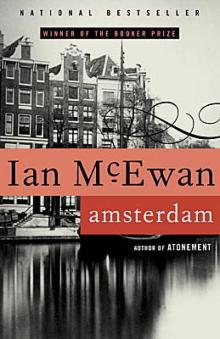 Amsterdam
Amsterdam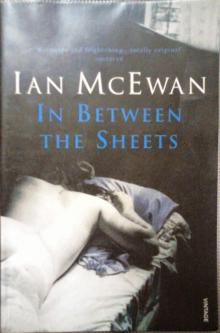 In Between the Sheets
In Between the Sheets Atonement
Atonement My Purple Scented Novel
My Purple Scented Novel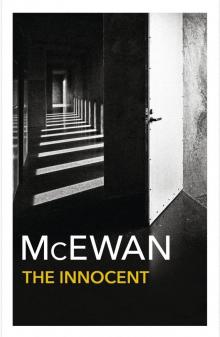 The Innocent
The Innocent The Children Act
The Children Act Enduring Love
Enduring Love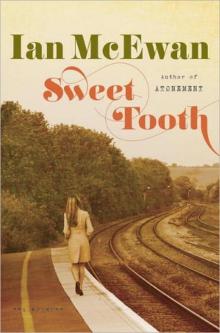 Sweet Tooth
Sweet Tooth On Chesil Beach
On Chesil Beach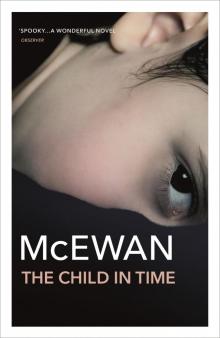 The Child in Time
The Child in Time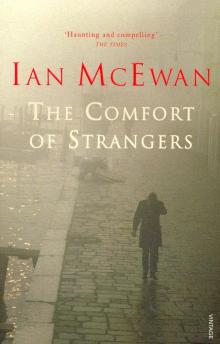 The Comfort of Strangers
The Comfort of Strangers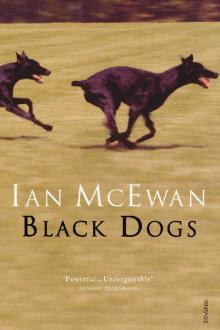 Black Dogs
Black Dogs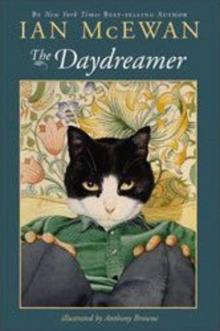 The Daydreamer
The Daydreamer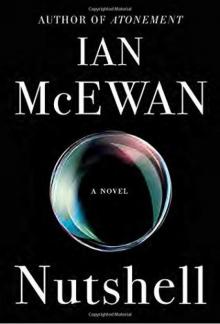 Nutshell
Nutshell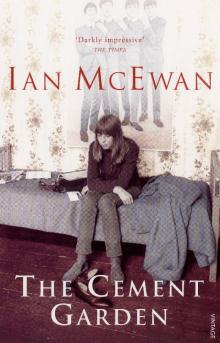 The Cement Garden
The Cement Garden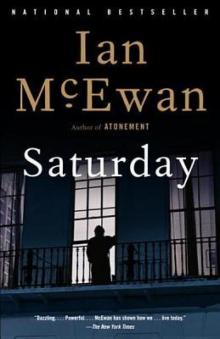 Saturday
Saturday Machines Like Me
Machines Like Me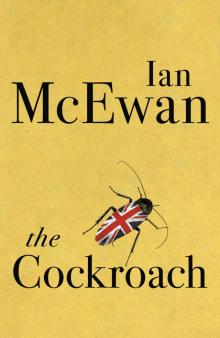 The Cockroach
The Cockroach The Ploughman’s Lunch
The Ploughman’s Lunch